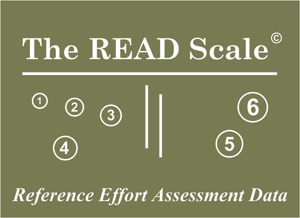|
|
Please notify Dr. Gerlich if you have interest in using the READ Scale at your library

- Answers that require the least amount of effort;
- No specialized knowledge skills or expertise;
- No consultation of resources;
- Less than 5 minutes;
Examples
- Directional inquiries;
- Library or service hours;
- Service point locations;
- Rudimentary machine assistance (locating/using copiers, how to print or supplying paper).

- Answers given which require more effort;
- Require only minimal specific knowledge skills or expertise;
- Answers may need nominal resource consultation.
Examples
- Call number inquiries;
- Item location;
- Minor machine & computer equipment assistance;
- General library or policy information;
- More complex machine assistance (how to save to a disk or email records, launching programs or re-booting).

- Answers in this category require some effort and time;
- Consultation of ready reference resource materials is needed;
- Minimal instruction of the user may be required;
- Reference knowledge and skills come into play.
Examples
- Answers that require specific reference resources (encyclopedias or databases);
- Basic instruction on searching the online catalog;
- Direction to relevant subject databases;
- Introduction to web searching for a certain item;
- How to scan and save images;
- Increasingly complex technical problems (assistance with remote use).

- Answers or research requests require the consultation of multiple resources
- Subject specialists may need to be consulted and more thorough instruction and assistance occurs.
- Reference knowledge and skills needed.
- Efforts can be more supportive in nature for the user, or if searching for a finite answer, difficult to find.
- Exchanges can be more instruction based as staffs teach users more in-depth research skills. Examples
- Instructing users how to utilize complex search techniques for the online catalog, databases and the web;
- How to cross-reference resources and track related supporting materials;
- Services outside of reference become utilized (ILL, Tech services, etc), collegial consultation;
- Assisting users in focusing or broadening searches (helping to re-define or clarify a topic).

- More substantial effort and time spent assisting with research and finding information.
- On the high end of the scale, subject specialists need to be consulted.
- Consultation appointments with individuals might be scheduled.
- Efforts are cooperative in nature, between the user and librarian and or working with colleagues.
- Multiple resources used.
- Research, reference knowledge and skills needed.
- Dialogue between the user and librarian may take on a 'back and forth question' dimension.
Examples
- False leads
- Interdisciplinary consultations / research;
- Question evolution;
- Expanding searches / resources beyond those locally available;
- Graduate research;
- Difficult outreach problems (access issues that need to be investigated).

- The most effort and time expended.
- Inquiries or requests for information can't be answered on the spot.
- At this level, staff may be providing in-depth research and services for specific needs of the clients.
- This category covers some 'special library' type research services.
- Primary (original documents) and secondary resource materials may be used.
Examples
- Creating bibliographies and bibliographic education;
- In-depth faculty and PhD student research;
- Relaying specific answers and supplying supporting materials for publication, exhibits etc; working with outside vendors;
- Collaboration and on-going research.
|

